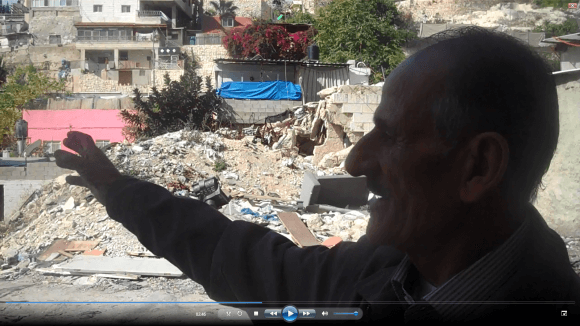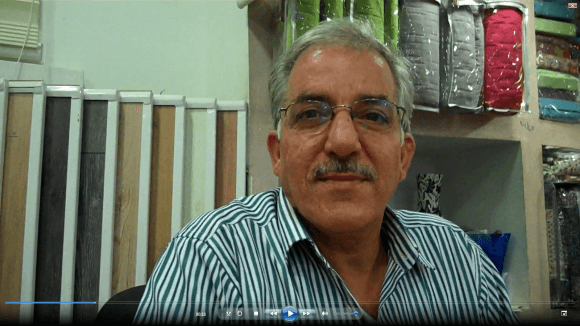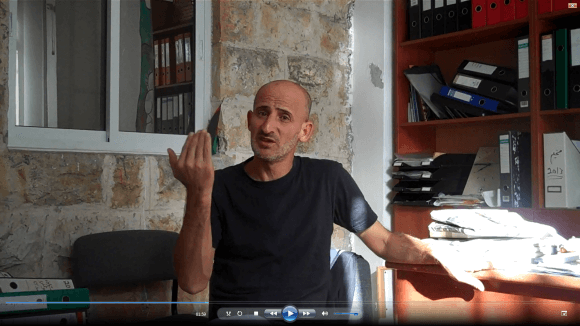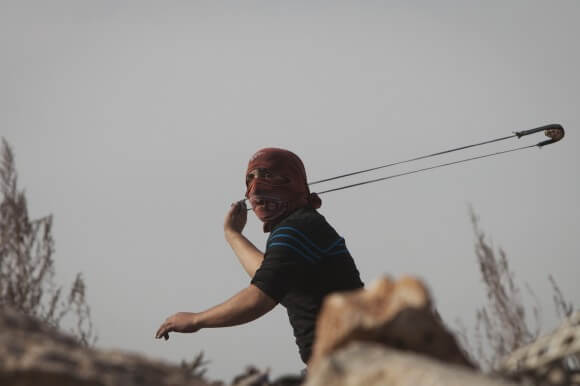Palestinians across East Jerusalem say that the violence that is shaking Jerusalem is not an intifada– yet. It is an unorganized Palestinian response to Israeli aggressive actions, including the visits by religious Jews to the Haram al Sharif or Temple Mount in the Old City. But it is not an uprising all over Palestine, as a third intifada would be.
That could begin in the blink of an eye. “Before you will open your eyes– it is a third intifada and bigger than the first and the second,” said Said Radi abu Snad, 75, a man whose house has six times been demolished in Silwan.

I interviewed two dozen Palestinians in East Jerusalem neighborhoods over the last week, and many said that they hope for another intifada. “During the first intifada my shop was only open three hours a day,” a Palestinian businessman who wished to be anonymous explained to me. “But I am crying for those days. We need a third intifada to end the occupation.” He said even businessmen feel they have nothing to lose because Israel has so encircled Jerusalem with checkpoints and Jewish settlements that the Palestinian economy is choked.
A second businessman entered his store and shook his head at the idea. “An intifada will makes things worse. It won’t end the occupation.”
It may be more accurate to describe the violence of the last three months as Benjamin Netanyahu’s intifada. The Israeli prime minister has escalated violent tensions again and again. He encouraged Jewish revenge for the three Israeli teens’ abduction and murders in June, creating fear across East Jerusalem; he conducted raids across the West Bank in June and July before escalating a conflict with Gaza leading to the massacres of hundreds; and lately he has encouraged far-right Jewish zealots to assert their claims at the Al Aqsa mosque and used Palestinian children’s stone-throwing in East Jerusalem to clamp down on those neighborhoods.
“People are willing to do anything because they are losing the hope. I think it could be worse than first intifada,” says Jawad Siyam, an activist against the occupation in Silwan who has been arrested many times. “The Israelis will not take a step back. They will keep attacking Al Aqsa.”
When I asked Siyam how important the mosque was to Palestinians, he said, “I wonder if you would ask the Catholics, how important is the Vatican to you? Let’s say, we share the Vatican with you, what would be their reaction?”
Another Palestinian in the neighborhood said, “Al Aqsa, it is very, very, very, very red line. We are not Da’ish [ISIS]. But we are Muslim, we go to pray as you go to pray in church. If anyone hurt the mosque, we will do more than Da’ish.”
Palestinians describe a regime of control and harassment all across East Jerusalem. Soldiers are at every corner in Shuafat. In Beit Hanina soldiers stand on overpasses above roads that serve Jewish settlements to prevent attacks. A surveillance balloon over Mount Scopus trains a camera on neighborhoods from Issawiya to Silwan. The Israelis have lately threatened up to 20 year prison terms for even young people throwing stones. The police issue tickets for minor traffic violations in an apparent effort to keep people in their homes; a medical student told me he leaves lab class early every day so as not to be on the street at night and risk arrest, and weeks or months of arbitrary detention.
“Whenever Palestinians start to shake or rattle, the Israelis press down,” a businessman near the Old City explained. “This is their only way, harassment.”
It is Netanyahu’s intifada because the Israeli prime minister has fostered much of the repressive and extremist actions over the last four months out of political need, to placate the far right. “This is an offensive by the government because Netanyahu is running forward to avoid a parliamentary crisis,” says Sergio Yahni, an Israeli activist marching in the Palestinian neighborhood of Issawiya. “He has been escalating the crisis for three months in order to resolve his political problems with the most extreme right.” Yahni explains that the zealots who want to build a temple in the place of the Al Aqsa mosque used to be “fringe of the fringe. But there is a direct connection from the fringe to the center.” In three telephone calls you can get from the zealot Yehuda Glick to the minister of the interior, Yahni said.
Netanyahu is weak, says Amiel Vardi, a professor of classics at Hebrew University, also marching in Issawiya. “I do not think that Netanyahu is giving himself a rational account of what he is doing. It seems he is acting rashly, looking at short term results only. And what’s worrying is, the next wave of violence will be higher.”

Palestinians describe the violent resistance so far as sporadic and not organized. Palestine has been successfully atomized by overwhelming military occupation; and yet each Palestinian community is alive to the others. A man in Issawiya shows me Facebook photos of Israeli soldiers entering Al Aqsa mosque, then explains that Gaza rose up last July after Shuafat rose up over the lynching of 16-year-old Mohammed Abu Khdeir. “And when Shuafat went crazy we had to stand up for Shuafat,” he said.
A grim aura of desperation and imprisonment hangs over these neighborhoods. Issawiya has been turned into a mini-Gaza, shut off by blockades from the roads going out to Jewish settlements to the north and south. While to the east you can see the famous wall, cutting the village off from its lands in the valley leading to Jericho. There are now Jewish settlements in the village of Beit Hanina, considered the Upper East Side of East Jerusalem, and Siyam says that to travel there from Silwan he must pass through four checkpoints. Silwan is filled with overhead surveillance cameras marking off the Jewish settlements penetrating the neighborhood. In Shuafat, the two light rail stations destroyed during riots protesting the Abu Khdeir lynching last July have not been renovated in five months since.

“There is no security, your are always insecure,” a 29-year-old Shuafat businessman told me in his shop before rushing off to teach a professional class. “You are afraid economically, politically, and physically.”
A mile away, Issawiya is so isolated that residents told me no western reporters had visited the neighborhood– not CNN, the Guardian or the New York Times. Only Israeli media.
“We thought the peace process was the light at the end of the tunnel,” says Fakhri abu Diab, of Silwan. “But the light has turned into a bulldozer. The people here have nothing to lose… And when the youth have nothing to lose it is very very dangerous.”
Meantime, the West Bank is largely quiet. Palestinian president Mahmoud Abbas has seen to that, keeping resistance from spreading to areas where Palestinians have more arms. A Palestinian man whose father helped organize the First Intifada said at that time, 1987, there were nightly meetings of political leaders who then worked with the boys throwing stones in the streets. Today’s actions are not nearly so organized, even as the occupation grinds on in humiliating ways. The soldiers stationed outside in Shuafat and Beit Hanina piss against the walls, and Abu Tor stinks of skunk water. That neighborhood was clamped down upon after a restaurant worker who was said to be enraged by Glick’s plans to take over the Al Aqsa mosque shot Glick in the street on October 29.
The Palestinian violence has had an impulsive and individualized character, notable for knife attacks at bus stops and cars driven into light rail stations in East Jerusalem. And though you hear Palestinians applauding these attacks as a form of resistance to occupation (and Israeli media calling this the silent intifada or individual intifada), those actions have not yet burgeoned into widespread activity. Israeli forces have largely succeeded in sewing up Palestinian communities. The streets of Issawiya are scorched by burning tires and businesses have shattered windows, but dozens of Israeli soldiers at barricades at each end of the village have managed to isolate those young people from nearby neighborhoods.
Thus the despair. No Palestinian I spoke with said he believed that any Palestinian action will end the occupation. Still the resistance this time has a method: it seems aimed at highlighting the totalitarian aspects of the occupation of Jerusalem to the world. A young man in Issawiya said that despite the absence of western press in his neighborhood, international media are portraying Palestinians in a new light. “It used to be the Palestinian is only a terrorist. Not this time.” A Palestinian activist told me that the world is at last getting to see Israel going haywire in its repressions, from the threat of 20 year sentences for boys throwing rocks to the on-again off-again encouragement of the Temple Mount activists with their connections to the Knesset.
The unending “Judaization” of Jerusalem by colonists claiming a deed based on 3000-year-old relics of Jewish settlement is demonstrating the strength of Palestinian steadfastness, Jawad Siyam says. “This is my country. I will not leave,” he says. “I can see my blood going drop by drop into this country… I am like a tree in my land.”

So the resistance is evidence of a non-negotiable demand that anybody anywhere can relate to: People must have their dignity.
Last Wednesday the villagers of Issawiya were joined by 200 Israelis who marched with them through the isolated neighborhood to plead with Israeli authorities to open the roads leading out of the scorched ghetto. I saw only Palestinian and Israeli media there, but for a brief time the demonstrators offered an inspiring vision of a future of equality– if there could only be political leadership. For both groups, Palestinians and Israeli leftists, are politically disenfranchised. The Temple Mount zealots can get an audience from the government, not these people.
And yet the Israeli solidarity activists left the neighborhood at 6 pm as night fell, amid generous thanks from the people of Issawiya– who were then left to face teargas and rubber bullets by themselves. There could be no more blatant evidence of apartheid Jerusalem.

The pleas for human dignity resonate in the rising alarm over Al Aqsa. Religious freedom is the very least that Palestinians can insist on, said the 29-year-old businessman in Shuafat. “We cannot have free speech, we cannot have the right to build, we cannot have the right of education. But we can at least have the freedom to pray to our god.”
Al Aqsa is the fire that Netanyahu has played with throughout the escalations of the last month. He has energized his right wing with the issue but threatened to catalyze a true Palestinian uprising. The medical student who leaves his lab early doesn’t want a third intifada to interrupt his studies. But if the Al Aqsa incitements continue, Palestinians will rise. “I don’t want more soldiers here,” he says. “I make the bottom line– Let them leave the Al Aqsa mosque, we leave them alone.”



In addition to all that crap we have the case of the bus driver who committed “suicide” in his vehicle with what looks like piano wire.
This morning the police made it official, the dude committed suicide because they autopsy failed to show signs of violence.
This is Haaretz today: “Ramouni’s family claimed he had no reason to commit suicide as he was not facing any crises. Colleagues of Ramouni said that Palestinian bus drivers have long been subjected to violence by Jews. However, according to a preliminary report, Israel Police suspected suicide, and claimed no signs of violence were found on Ramouni.
CCTV footage from the bus depot may prove crucial in proving or disproving the two conflicting causes of death.”
Sweet baby Jesus, it’s the Abu Khdeir killing all over again! Release the damn footage!
>> Palestinian businessman, anonymous, East Jerusalem
Remaining anonymous is much easier when you don’t include a nice photo of yourself along with your comments.
Be safe, “anonymous” Palestinian businessman.
Great title and article!
I am reminded once again of Phil Zimbardo’s book, the Lucifer Effect, about the Stanford Prison Experiment, in which ordinary Northern California college students randomly sorted into prisoners and guards, and placed in roles running, or being confined in, a prison block, were rapidly transformed in both cohorts, with the guards becoming cruel and sadistic, enjoying the torment they put their charges through, with the prisoners lapsing into a state of frustrated dependence, a version of the Stockholm syndrome.
His point is that ordinary human beings are psychologically capable of playing both roles, given the social structure driving them to it.
“Netanyahu’s Intifada” is a great title for the unfolding chapter.
“Likud’s Lucifer Effect” is offered up as a broader title for how God’s Chosen People could find themselves the driving force in such a historical catastrophe. [Hint: they’re ordinary human beings like everyone else.]
[By the way, Zimbardo terminated his experiment early, shocked by some of the behavior unleashed, perhaps suggesting the way to avoid the worst potential consequences of Israel’s current course of action.]
When I asked Siyam how important the mosque was to Palestinians, he said, “I wonder if you would ask the Catholics, how important is the Vatican to you? Let’s say, we share the Vatican with you, what would be their reaction?” – See more at: https://mondoweiss.mystagingwebsite.com/2014/11/netanyahus-intifada#sthash.KRTAqRKQ.dpuf
great question: Ask Muslims how they would feel sharing Mecca or Medina. How Catholics would mind sharing Vatican or Russian Orthodox mind sharing St.P. Or the Shi’a sharing their shrines in Qom and then ask Jews how they like sharing the Temple Mount-(which they do). It always struck me as absurd how the Arabs like to claim Jerusalem has little significance to Jews and so much significance to Muslims yet is not mentioned in their holiest of religious books. And while some Jews may be interested inb praying there there is no serious move being made to alter the status of the mount being a Muslim shrine.
Don`t you have a feeling sometimes that Palestinians are not fighting Israel but History itself. This is the tenth if not twentieth round and compare today`s Israel to what it was when these battles began about a century ago. Would it not be much better for everybody directly concerned (faraway cheerleaders excluded) to accept a status-quo in which the country is indeed a Jewish state with a cooperating, rather than endemically hostile, attitude as a minority? Jews were in thousand worse conditions as minorities in other countries, West and East, yet managed in most of the time to be cooperative in their host countries. That attitude – staying loyal to own tradition yet being receptive to others – is perhaps the single most important reason why they lasted through all that so long. Indeed, if not the final, insanely murderous, assault on them in WW2 that would have continued to this date.
Constantly fighting is not leading Palestinians anywhere but they apparently cannot stop that – pushed at every round by some arousing rhetoric that promises a lot but in the end yields little.